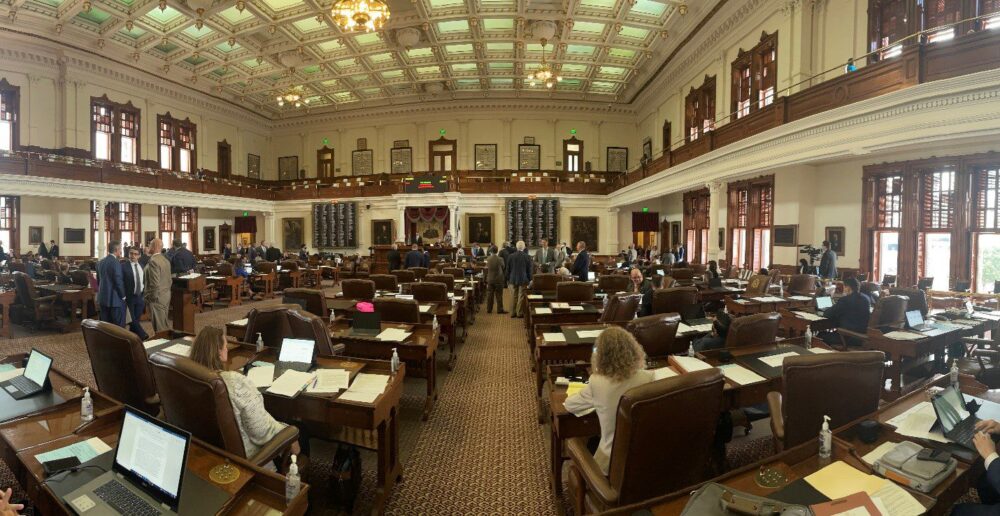On Friday, the Texas House of Representatives passed SB 1, a highly controversial election reform bill. This is the same legislation that caused many House Democratic Caucus members to flee for Washington D.C. and petition Congress for federal action. This move refused the constitutionally required quorum needed to conduct business.
The contentious legislation has gone by numerous bill numbers this year due to the issue spanning multiple legislative sessions. The bill originated in the 87th Regular Legislative Session that started in January. It was given multiple committee hearings as HB 6/SB 7 and allotted time for full consideration before Democrat opponents vacated the House Floor for the third reading vote in May.
In July, the bill was filed as HB 3/SB 1 and another committee hearing ensued, however, it was not debated by members due to a lack of quorum. It was given yet another committee hearing in the current special session as SB 1 and ultimately advanced to the House Floor once a quorum was restored.
Many Democrat representatives are still absent from the House Chamber even after a quorum has been restored. At the time of this writing, local Dallas County members that have yet to return include representatives Jasmine Crockett, Jessica González, Terry Meza, Ana-Maria Ramos, Toni Rose, and Carl Sherman. Dallas area Democrats that did return include representatives Rafael Anchia, Rhetta Bowers, Yvonne Davis, and Victoria Neave. Representative John Turner of Dallas never left, but remained behind to watch over the House in the absence of a quorum.
Republicans have repeatedly touted their slogan for the bill, “Easier to Vote, Harder to Cheat.” Meanwhile, House Democrats contend that the passed election reform bill is an attack on democracy, and functions to suppress the vote of minorities, persons of color, along with the elderly and disabled.
A particular provision in the bill they ridicule is the requirement that mail-in ballot applications be submitted along with the applicant’s driver’s license number, or the last four of their social security. In 2007, Representative Rafael Anchia (D-Dallas) was cited saying that mail-ballots were where voter fraud was most prevalent. During that debate on HB 218, he stated that the bill allowed “vote by mail to continue without photo identification” and that it was “the greatest source of voter fraud” in Texas.
Fourteen years later, lawmakers attempted to address that concern, but the rhetoric, House Republicans argue, has inexplicably changed. Currently, over thirty-five states have a form of voter identification laws.
Another complaint launched by opponents of the bill claim that partisan poll watchers would be allowed to intimidate voters while they cast their ballot. House Republicans argue they are simply protecting the poll watchers’ ability to be present in polling places and at vote-counting centers. During debate, Rep. Slaton (R-Royce City) spoke of his father who was a poll watcher during the 2020 General Election. Slaton said his father was “escorted out of the room at three a.m. and wasn’t allowed to watch any of the tabulation” of the votes.
Accusations pertaining to the mistreatment of poll watchers have triggered numerous lawsuits. Multiple legal challenges have been filed against Dallas County elections, including a lawsuit by Congressman Lance Gooden (R-Terrell). Gooden asserts his poll watchers were also kicked out and not allowed reentry.
“Voters deserve to see how their ballots are counted,” he said. “Democrat-run governments on every level will do anything to tip the scales in their favor. We’re not going to let them get away with it.”
Once debate began, over eighty-nine amendments were filed, but only sixty-three were laid out. The amendments caused the debate to go late into the night on Thursday during the bill’s second reading.
Rep. Anchia offered an amendment to strike the enacting clause that would stop the legislation from moving forward; it failed by a vote of 40 ayes to 79 nays.
Local representative Victoria Neave (D-Dallas) offered three amendments to the bill. The first would allow persons presenting symptoms of COVID to be among the permissible persons allowed to vote curbside, like individuals who have a physical disability. Her second amendment would require election workers to post notices outside the polling place informing them about a voter’s right to vote and instructions for voting. The third would require the Attorney General of the United States to assure the bill would not affect a person’s right to vote because of their race or color. All three amendments failed on party line votes.
In closing arguments on Friday, Rep. Anchia said, “I know the people of Texas are watching, but I also know the people of this country are watching. And they saw what were very good arguments, in my view, that were tabled, that were defeated with, in some cases, little debate. In some cases, pure dismissiveness.”
The bill was debated for over twelve hours before being passed 80 to 41.
SB 1 was sent back to the Senate on Friday, where the upper chamber refused to concur with House amendments. They will appoint conferees to agree on final changes. After a consensus is reached, the bill will be sent back to each chamber for a final vote before being sent to the Governor to be signed.

